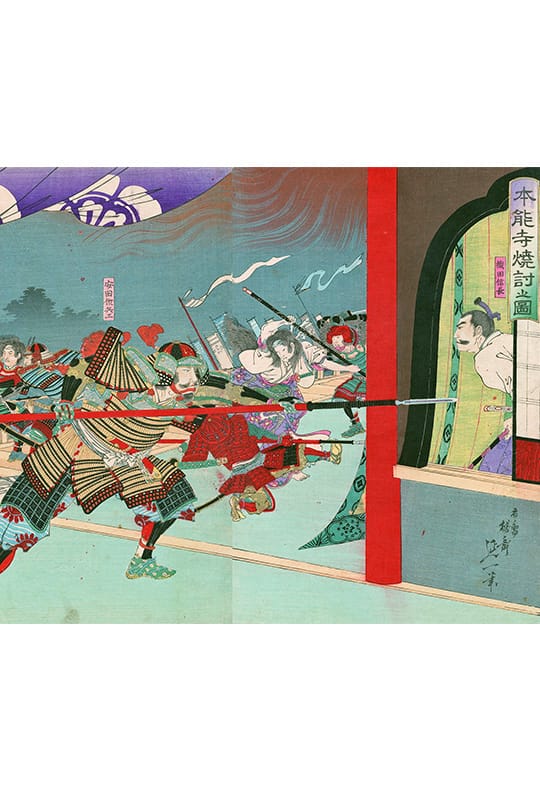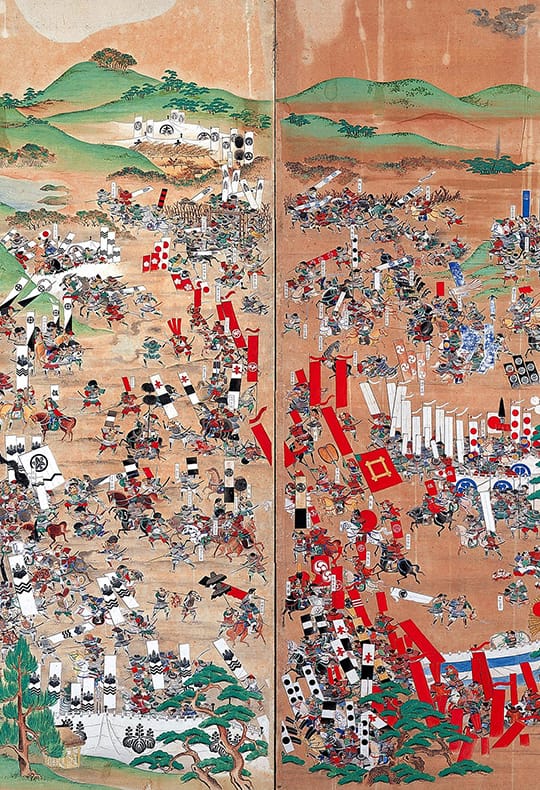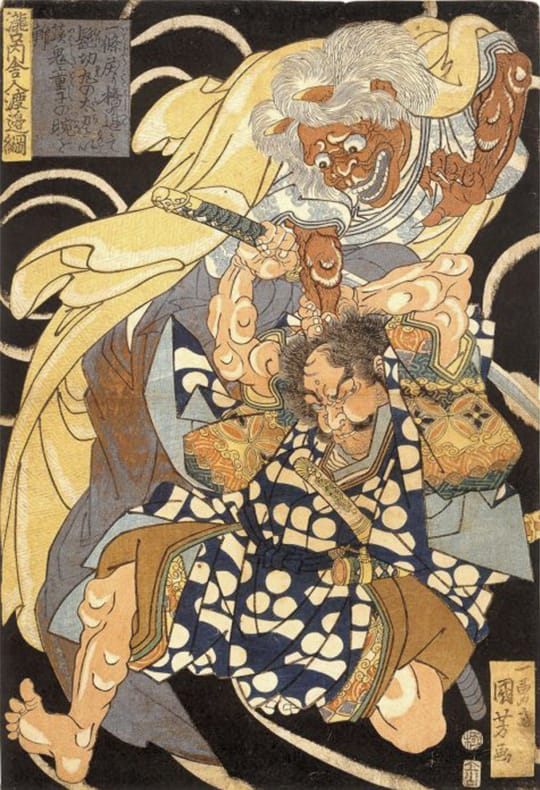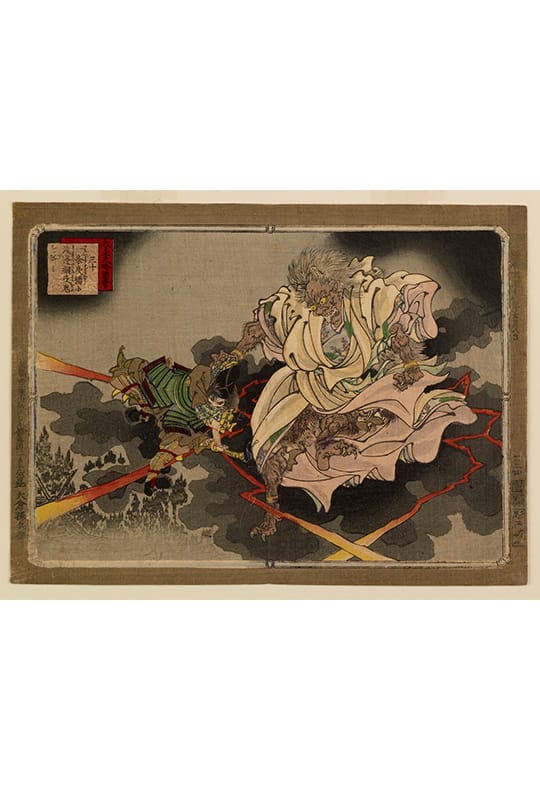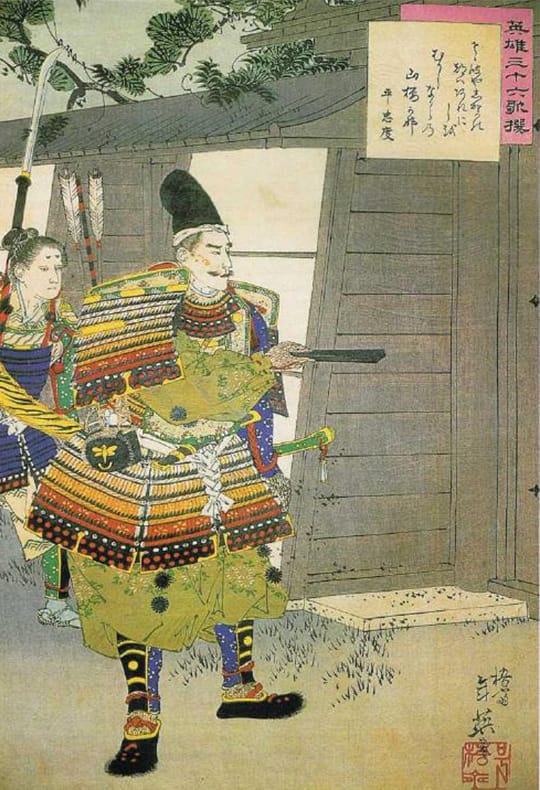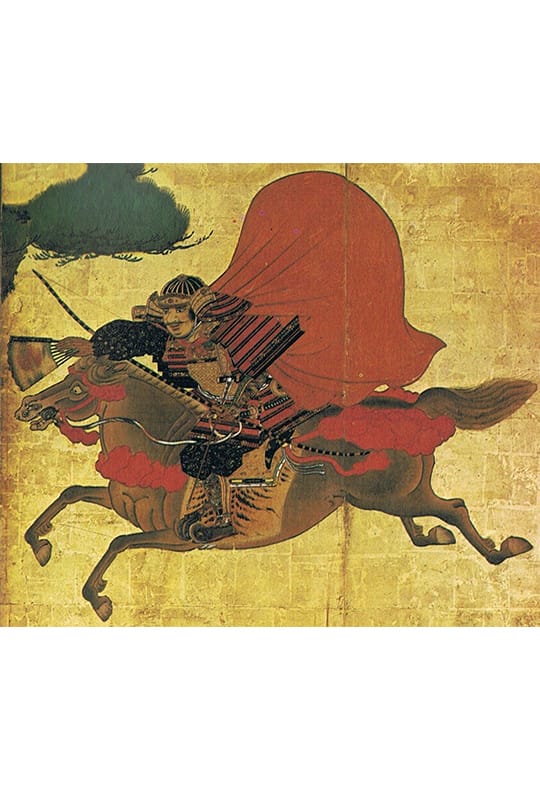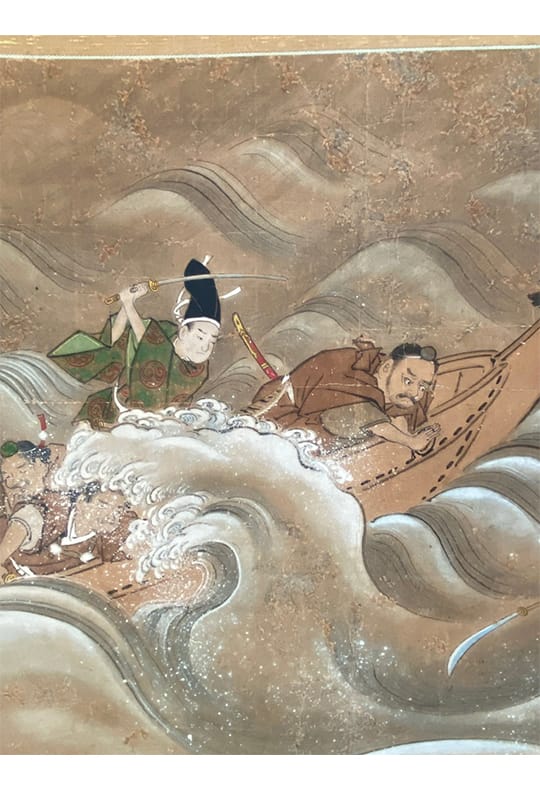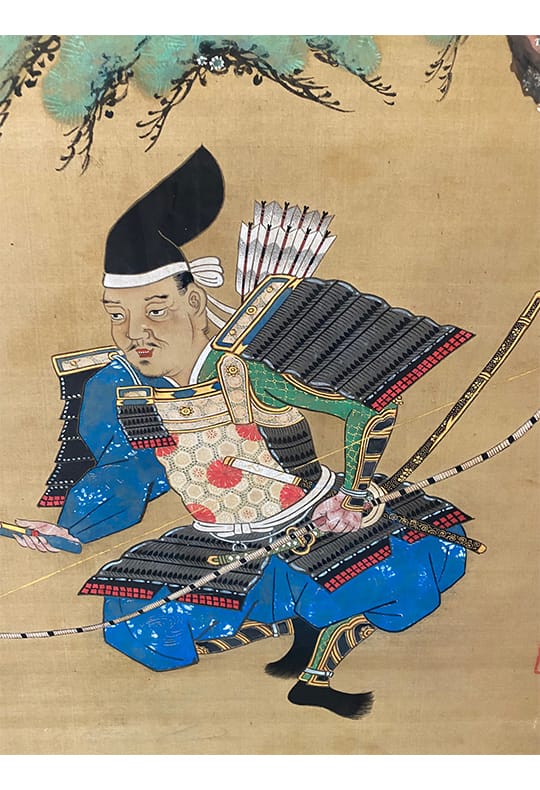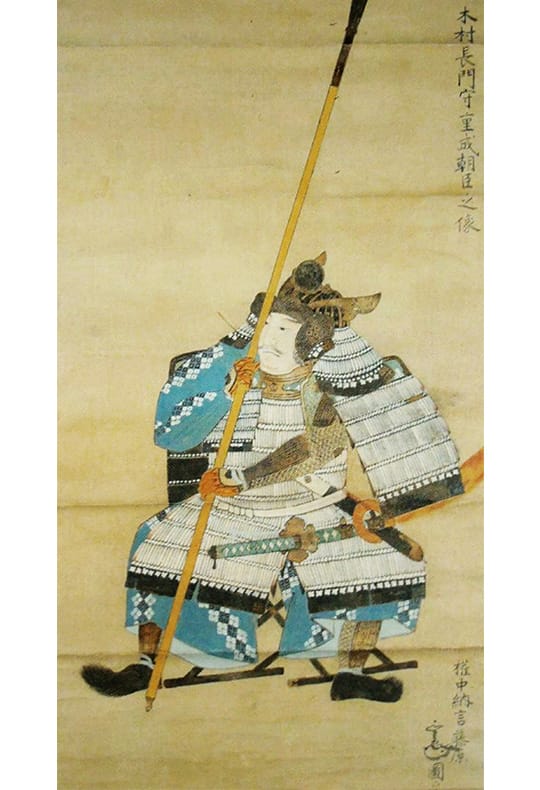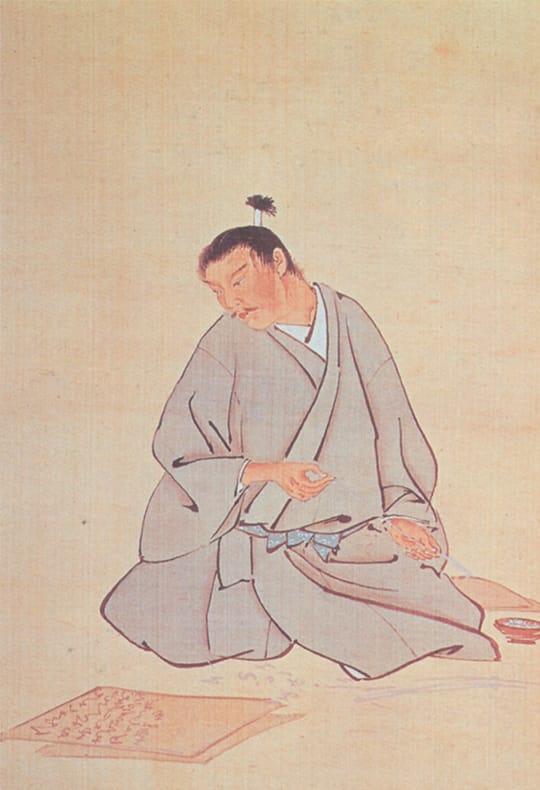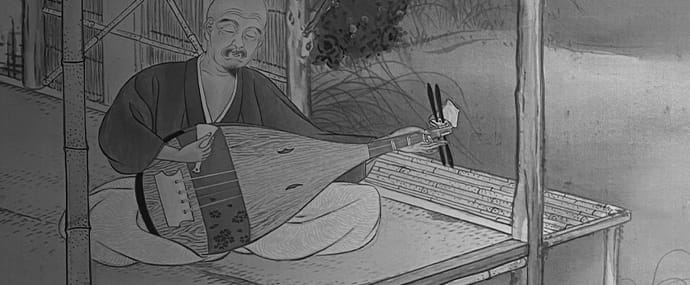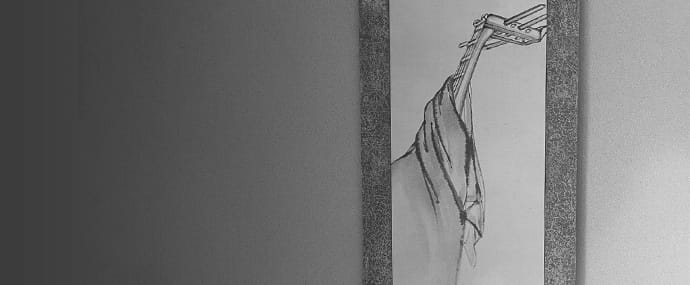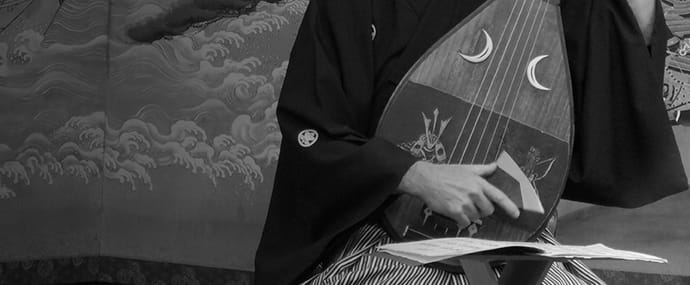Kyoto-search

kosui watari
湖水渡
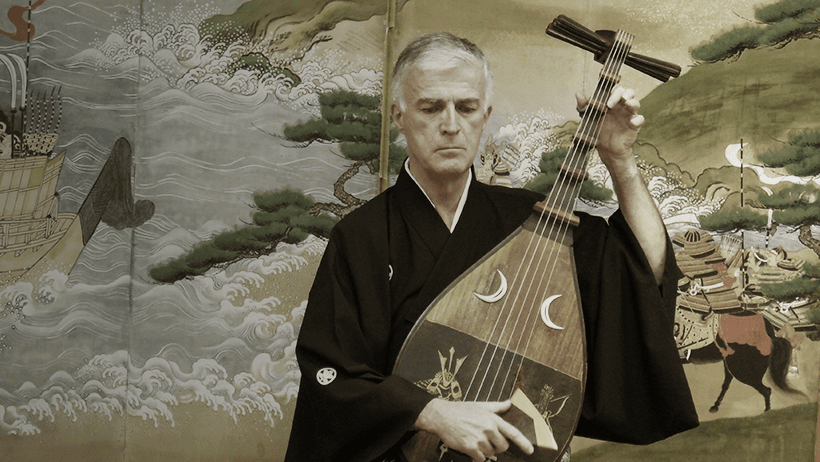
Introduction
On the 13th day of the 6th month in the 10th year of the Tenshō-Era (2nd July 1582), AKECHI Mitsuhide, who had earlier killed his own lord, ODA Nobunaga, at the Honnōji temple in Kyoto on June 21st and who hoped to become Japan’s leading warlord, was defeated in the battle of Yamazaki by HASHIBA Hideyoshi and later killed in Ogurusu on his return to the castle in Sakamoto. At this time, Mitsuhide’s son-in-law, Mitsutoshi, was positioned at Azuchi castle on the east side of Lake Biwa to protect the eastern flank from enemy troops. Historical documents reveal that when Mitsutoshi was informed of the defeat in the Yamazaki battle, but not of Mitsuhide’s death, he left Azuchi on the 3rd of July in the direction of Sakamoto to support his liege. On the 4th, when he arrived at Sakamoto castle, he encountered the renowned general, HORI Hidemasa, who also figures in this ballad. Acknowledging the defeat of the AKECHI clan, Mitsutoshi presented Hidemasa with a treasured family heirloom, a sword, and then committed suicide with the rest of the AKECHI family.
According to historians, the story of Mitsutoshi having crossed Lake Biwa on his horse is not based on fact, but a brilliant story first related in the Kawasumi Taikōki (ed. 1615-1624) and again in the Ehon Taikōki (ed. 1797-1802), the latter providing many of the details in this ballad.
The Ride across Lake Biwa is one of the staple works of the chikuzen biwa repertoire. It is also a popular satsuma biwa piece as the text embodies the formidable virtues of the samurai. After the opening lines of the ballad, an ancient Chinese proverb on loyalty —assuredly beyond our present-day acceptance and understanding of loyalty and its limits— is presented: “The dog of an evil master even barks at a saint when asked to do so.” Mitsutoshi held a similarly problematic space in the Japanese imagination. Despite his father-in-law, AKECHI Mitsuhide, having been considered a traitor and despised by the shogunate of the late Edo-Period according to the ideology of the time, Mitsutoshi is nonetheless perceived as having done the correct thing when in assisting him as Mitsuhide was both his kinsman and his liege. In following the command of his evil master and providing support without question, Mitsutoshi is the dog of the Chinese proverb.
One profoundly moving scene of this ballad is the end. Legend holds that when Mitsutoshi, finally committed suicide (seppuku) at Sakamoto castle after having killed the wife of his lord, he used the blood from his own eviscerated intestines to write his farewell poem. Similar legends about other samurai exist and the Mitsutoshi suicide legend should not be taken as the sole example. Despite the inherent dramatic possibilities of transforming this legend into a gruesome biwa-ballad tableau embodying the ethos of the samurai, nothing of this sort is present here. In its stead, the dejected samurai speaks to his horse, Ōkage, of their final glorious ride through Lake Biwa. He voices his gratitude to his horse and then dramatically documents his ride on a paper envelope for incense he was carrying in bold strokes with his ink brush. He then turns to walk away with that knowledge that everything is lost.
Synopsis
In the struggles to unify Japan at the end of the 16th century, ODA Nobunaga, the first of the three dominant warlords, was killed in the Honnōji incident of 1582. His assailant, AKECHI Mitsuhide, hoped that in disposing of Nobunaga, he would then become the most potent warlord in the power plays of the era. Shortly after his deed, however, Mitsuhide had to face HASHIBA Hideyoshi, ever loyal to Nobunaga, and his troops at Yamazaki. Hideyoshi’s forces crushed Mitsuhide’s, and Hideyoshi eventually succeeded Nobunaga.
Mitsutoshi was Mitsuhide’s son-in-law and holding the castle of Azuchi on the east side of Lake Biwa. When he heard the news of the disastrous battle against Hideyoshi, Mitsutoshi felt compelled to help Mitsuhide, his lord, and attempted to join him and his army on the west side of Lake Biwa Mitsuhide’s castle was located.
He set out with his men in the direction of Ōtsu, but suddenly encountered HORI Hidemasa, a foe in command of a large force. Mitsutoshi fought desperately and seizing a moment to escape to Sakamoto, he turned his horse Ōkage, and drove through the shallow waters of Lake Biwa. This shortcut allowed him to successfully escape his pursuers, and his “Ride across Lake Biwa” subsequently became a famous literary theme. This version is notably beautiful for both text and music.
When Mitsutoshi reached the Karasaki shore, he praised his faithful steed for its strength and courage but was nonetheless aware that this day marked the downfall of the AKECHI clan and that his final act would be to take his own life. Concerned about the future owner of his fabulous horse, he documented the glorious ride in powerful brush strokes onto an incense envelope he was carrying with him. He then bid farewell to the sadly neighing horse and walked to the AKECHI castle in nearby Sakamoto, where he put an end to himself and his family. This, however, is no longer included in the ballad.

Lyrics
-
1. As the perceptive bird chooses the woods where it nests, Wie der schlaue Vogel, der (zum Brüten) seinen Hain sich wählt,
Sore ryōkin wa hayashi o erami 夫れ良禽は林を撰み
-
2. the wise man chooses the master he serves. sucht sich der kluge Samurai den Meister, dem er dienen will –
kenja wa kimi o eramu to ka ya 賢者は君を撰むとかや
-
3. But once having committed to service mit ganzem Herzen Einsatz leisten,
saredo ittan mi o yurushi されど一旦身を許し
-
4. and fully accepting the master’s rule ist der wahre Dienst des Ritters.
shū to tanomishi hito no tame 主と頼みし人の為め
-
5. – good or bad – one has sacrificed his life. Wer nicht fragt nach Gut und Böse,
zennaku tomo ni mi o sutete 善悪共に身を棄てゝ
-
6. Like the dog of King Jie who barked at King Yao. gleicht dem guten Hund des bösen Kaisers Jie, der den edlen Yao biss.
Kekku ga Gyō ni hoyuru naru 桀狗が尭に吠ゆるなる
-
7. Loyalty, as well as the temperament to carry arms, Loyale Krieger kennt man daran,
chūgi o nasu mo mononofu no 忠義をなすも武士の
-
8. is what distinguishes the warrior. wie sie Pfeil und Bogen führen.
yumiya no iji to shirarekeri 弓矢の意地と知られけり
-
9. So listen: AKECHI Hyūganokami Mitsuhide Lasst uns jetzt von AKECHI Hyūganokami Mitsuhide hören,
koko ni AKECHI Hyūganokami Mitsuhide wa 茲に明智日向守光秀は
-
10. was in the battle of Mount Tennō der am Berge Tennō in der Schlacht
Tennōzan no issen ni 天王山の一戦に
-
11. and with his men, soon destroyed, mit seinen Mannen ganz entschieden unterlag.
mikata morokumo uchiyabure 味方脆くも打敗れ
-
12. his troops scattered in all directions, In alle Winde flohen seine Truppen,
dōzei yomo ni sanransu to 同勢四方に散乱すと
-
13. and their defeat soon known throughout the land. was niemandem verborgen blieb.
haya kakurenaku kikoekeri はや隠れなく聞えけり
-
14. The Azuchi Castle’s deputy lord, Das Schloss von Azuchi,
Azuchi no shiro no rusui naru 安土の城の留守居なる
-
15. AKECHI Samanosuke Mitsutoshi, war in den Händen von AKECHI Samanosuke Mitsutoshi,
AKECHI Samanosuke Mitsutoshi wa 明智左馬介光俊は
-
16. uneasy over his lord’s whereabouts, der sich jetzt um seinen Herrn viel Sorgen machte.
kimi no sendo no obotsuka naku 君の先途の覚束なく
-
17. hoped to ascertain the state of the battle, Eifrig hielt er Ausschau nach dem Feind
ikusa no yōsu minmono to 軍の様子見んものと
-
18. and rushed to the Seta bridge. und eilte fort in Richtung Seta-Brücke,
isogeba mawaru Seta no hashi 急げば廻る瀬田の橋
-
19. No enemies were seen as he passed through the fields of Awazu, preschte durch das Feld von Awazu
teki ni Awazu no hara koete 敵に粟津の原越へて
-
20. and he hastened to the shores of Uchide no hama. und hastete zum Strand von Uchide no hama.
momi ni monde zo Uchide no hama 揉みに揉んでぞ打出の浜
-
21. As he was arriving at the lodge of Ōtsu, Angekommen bei den Otsu-Reiseunterkünften,
Ōtsu no shuku ni kakaru koro 大津の宿にかゝる頃
-
22. he suddenly encountered the main body of the enemy forces: traf er – nein doch! – auf die Hauptarmee
hatta to deaishi taigun wa ハッタと出逢ひし大軍は
-
23. HORI Kyūtarō Hidemasa with 10,000 horsemen. von HORI Kyūtarō Hidemasa mit zehntausend Reitern.
HORI Kyūtarō Hidemasa ga ichimanki 堀久太郎秀政が一万騎
-
24. “Ah, is it Hidemasa who has arrived? “Ist das nicht Hidemasa, der mir da entgegenkommt!
yaore Hidemasa kitarishi ka やおれ秀政来りしか
-
25. Having seized Mount Tennō Du hast am Berge Tennō klar die Schlacht für dich entschieden,
Tennōzan o torikirishi 天王山を取り切りし
-
26. your abilities with tactics make you the ideal foe. bist ein Gegner von Format.
buryaku wa sasuga no teki naru zo 武略は流石の敵なるぞ
-
27. To engage with you will be a lifelong honor Mit dir zu kämpfen bringt mir größten Ruhm,
iza Mitsutoshi ga ichigo no nagori いざ光俊が一期の名残
-
28. and a tale for the coming generations.” der nie vergehen wird. Drum also los, ihr Männer!“
katari tsugasen monodomo to 語りつがせん者共と
-
29. He gathered the courage of his men rief er seinen Leuten zu.
mikata no yūki hagemashite 味方の勇気励まして
-
30. and attacked in sudden desperate ferocity Die griffen nun aufs Heftigste die Feinde an und kämpften
dotto bakari ni tsukikakari どっとばかりに突きかゝり
-
31. engaging and retreating, thrusting and cutting, schlagend, stoßend, hauend, stechend.
tomoe manji ni kirinabike 巴卍に切り靡け
-
32. rushing to the East, and running to the West, Als sie ostwärts stürmten, westwärts rannten,
nishi ni higashi ni shutsubotsushi 西に東に出没し
-
33. moving with demonic speed. drehten sie sich, dass gar Teufel staunten.
kijin fushigi no hataraki ni 鬼神不思議の働きに
-
34. Hidemasa’s troops were at a loss, Selbst der riesigen Armee war das zu viel,
sashimo no taigun moteamashi さしもの大軍もてあまし
-
35. and they wavered. die Truppen machten sich bereit zum Rückzug.
ukiashi tachishi shioai o 浮足立ちし潮合を
-
36. In a flash, Mitsutoshi saw his opportunity. Da erkannte Mitsutoshi plötzlich eine Chance,
koko to mitetoru ikkokyū こゝと見て取る一呼吸
-
37. This is where I escape! flugs dem Feinde zu entwischen.
satto bakari ni norinukete サッとばかりに乗り脱けて
-
38. Taking a breath, he shouted. Jetzt, ein tiefer Atemzug, ein Schrei
hitoiki nomishi kakegoe ni 一と息呑みし掛声に
-
39. His horse immediately flew, und wie der Blitz – als würd‘ er fliegen –
uma wa tachimachi tobu gotoku 馬は忽ち飛ぶ如く
-
40. and into the waters of the famed Ōmi Lake stürzt er in den wohlbekannten See von Ōmi,
na ni ou Ōmi no mizuumi ni 名に負ふ近江の湖に
-
41. they leapt with a huge splash. dass es spritzt – mit einem Riesensprung!
zanbu to bakari odoriiru ザンブとばかり躍り入る
-
42. The excellence of the horse was widely known, Das Pferd gilt überall als ausgezeichnet,
uma wa tenka no ichimotsu nari 馬は天下の逸物なり
-
43. and its rider recognized for his skills over many years und der Reiter ist seit langem schon Legende.
norite wa moto yori kokon no tassha 騎手は固より古今の達者
-
44. Straight as the Chinese character for “one” they swam. Schnurgerade, wie die „Eins“ geschrieben, reitet er drauflos,
maichimonji ni norikiru sama wa 真一文字に乗切る様は
-
45. Is this a man or is this a spirit? – ein Gott – ein Mensch, wer soll das wissen.
kami ka hito ka to miru bakari 神か人かと見るばかり
-
46. The waters mingled with the heavens. Ist es Wasser oder Himmel – Himmel oder Wasser –
mizu ya sora sora ya mizu 水や空空や水
-
47. and as far as could be seen, nothing but blue! blau nur ist’s, so weit das Auge reicht.
manako no kagiri ippeki no 眼の限り一碧の
-
48. As Ōkage, the horse, kicked up waves, Ōkage, das Pferd, durchmisst die Wellenflut.
nami o ketatsuru Ōkage ni 波を蹴立つる大鹿毛に
-
49. Samanosuke, in his red-threaded armor, Samanosuke in seinem roten Schuppenpanzer
hiodoshi kitaru Samanosuke 緋縅着たる左馬介
-
50. was resplendent in his valor ist ein Bild grandiosen Rittertums.
hitokiwa me ni tatsu mushaburi ni 一と際目に立つ武者振に
-
51. The unparalleled painter Eitoku Denn Eitoku, der große Maler hatte ihm
musō no meijin Eitoku ga 無双の名人永徳が
-
52. had painted with the utmost skill auf seine Rüstungsweste
tansei komete egakitaru 丹精こめて画きたる
-
53. a dragon on his battle coat, mit dem Tuschepinsel herrlich einen Drachen hingemalt.
sumie no ryō no jinbaori 墨絵の龍の陣羽織
-
54. which fluttered in the winds from Mount Hiei. Vom Hiei-Berg herunter weht ein starker Wind,
Hieiyama oroshi ni hirugaeshi 比叡山颪に翻へし
-
55. With a gentle yet firm touch, bald ruhig und dann wieder heftig knallt er mit der Peitsche.
arui wa kan ni mata kyū ni 或は緩に又急に
-
56. he valiantly wielded his crop Ist das nicht ein Anblick – dieser Mut und diese Tapferkeit, unglaublich!
agemuchi furuu isamashisa 揚鞭揮ふ勇ましさ
-
57. When the horse tired, his rider lent his succor, Ist das Pferd erschöpft, hilft ihm der Reiter,
uma tsukarureba hito tasuke 馬疲るれば人助け
-
58. and when the man tired, he turned to his horse, ist der Reiter müde, kann er sich aufs Pferd verlassen.
hito tsukarureba uma ni yori 人疲るれば馬に頼り
-
59. as they crossed the wide waters of the lake Auf dem riesig weiten See,
sashimo ni hiroki mizuumi o さしもに広き湖を
-
60. afraid of nothing. da hat er keine Angst.
koto to mo sezaru futekisa ni 事ともせざる不敵さに
-
61. His pursuers were awed. Alle Augen der Verfolger haften an dem Reiter.
otte no sei mo ki o torare 追手の勢も気を取られ
-
62. As if bound in a spell, Wie benommen rufen sie:
eiru ga gotoki kokochi shite 酔ひるが如き心地して
-
63. all they could do was cry, “Look! Look!” „Das ist doch nicht zu fassen, nicht zu fassen!“
areyo areyo to iu bakari あれよあれよと云ふばかり
-
64. There was not one person who thought to shoot Niemand schießt mehr aus der Ferne
tada hitosuji no tōya da ni たゞ一筋の遠矢だに
-
65. an arrow from the distant shores. einen Pfeil auf ihn.
ikaken hito mo nakarikeri 射かけん人もなかりけり
-
66. Finally, Mitsutoshi reached Karasaki Bei Karasaki kann Mitsutoshi
Mitsutoshi yagate Karasaki no 光俊やがて唐崎の
-
67. where he landed on the shore. dann an den Strand gelangen.
hama no konata ni uchiagari 浜の此方に打ち上り
-
68. Letting the water run from his armor and the horse, Wasser rinnt ihm von der Rüstung,
uma mononogu no mizu hashirase 馬物の具の水走らせ
-
69. he caressed the mane of his beloved steed. während er die Mähne seines Pferdes streichelt.
aiba no tategami nadeagete 愛馬の鬣撫で上げて
-
70. “Listen, Ōkage! „Höre, Ōkage, mein Pferd,
ika ni Ōkage uketamaware 如何に大鹿毛承はれ
-
71. In the many years of my fame as a warrior, du hast mir während manchen Jahren meiner Ritterzeit
Mitsutoshi tanen buyū no homare 光俊多年武勇の誉
-
72. you were an honor. viel Ruhm gebracht.
nakaba wa nanji ga isaoshi zo 半は汝が勲功ぞ
-
73. That such a famous horse Ein weitherum bekanntes Pferd wie du
kakaru meiba o Mitsutoshi ga かゝる名馬を光俊が
-
74. should die with his owner, darf nicht mit Mitsutoshi sterben,
inochi to tomo ni korosan wa 命と共に殺さんは
-
75. I feel is too regrettable! traurig, allzu traurig wäre das.
itoito oshiki kokochi zo suru いといと惜しき心地ぞする
-
76. You should live longer in brilliance. Du sollst auf jeden Fall noch länger leben
appare nanji wa nagaraete 天晴汝は長生へて
-
77. Find a distinguished master, und den besten Meister finden,
buyū sugureshi shū o tori 武勇勝れし主を取り
-
78. go with him to the fiercest battlefield. der mit dir selbst durch die Hölle geht.
shura no chimata o hase meguri 修羅の巷を走せめぐり
-
79. People will say, ‘This could only be AKECHI’s horse „Dies Pferd gehörte AKECHI“,
sasuga wa AKECHI ga uma nari to 流石は明智が馬なりと
-
80. and my name as a warrior das werden viele Leute sagen,
waga bumei o mo nochi no yo no 我が武名をも後の世の
-
81. will remain as a tale of a warrior. und damit machst du mir viel Ehre.
buhen no katari ni nokose kashi 武辺の語りに残せかし
-
82. Do you understand this, Ōkage?” Ōkage, verstehst du?“
yayo Ōkage yo kokoroeshika to やよ大鹿毛よ心得しかと
-
83. He demanded. fragt er aufgewühlten Herzens,
magokoro komete iikikase 真心こめて言ひ聞かせ
-
84. He tied Ōkage to a pillar of the Jūō-Hall, während er das Pferd an einen Pfeiler bei der Jūō-Halle bindet.
Jūōdō no hashira ni tsunagi 十王堂の柱につなぎ
-
85. withdrew his writing case, Einen Pinsel, Tusche und den Reibstein packt er aus,
yagate yatate o toriidashi やがて墨斗を取り出し
-
86. and opened an envelope of incense. benutzt den Beutel-Umschlag seines Räucherwerks und schreibt darauf:
kō no tsutsumi o oshihiraki 香の包を押し開き
-
87. “On the 14th day of the 6th month in the 10th year of Tenshō (1582) „Im Jahre 10 von Tenshō (1582) hat im 6. Monat am 14. Tag
Tenshō jūnen rokugatsu jūyokka 天正十年六月十四日
-
88. I, AKECHI Samanosuke Mitsutoshi AKECHI Samanosuke Mitsutoshi
AKECHI Samanosuke Mitsutoshi 明智左馬介光俊
-
89. am the one who crossed the lake on this horse”, den Biwasee auf diesem Pferde überquert“.
kono uma o motte kosui o wataru mono nari to この馬を以て湖水を渡る者也と
-
90. he wrote in thick, strong strokes. Das hält er fest mit breitem, dickem Pinsel.
fude futobuto to kakinokoshi 筆太々と書き遺し
-
91. “Farewell,” he said, and started to leave. „Lebe wohl,“ sagt er und schickt sich an zu gehn.
iza to bakari ni tachisareba いざとばかりに立去れば
-
92. The horse, perhaps also ruing this parting, Das Pferd versteht, dass dies die Trennung ist
uma mo nagori o oshimite ka 馬も名残を惜みてか
-
93. nickered plaintively. und wiehert herzzerreißend.
koe mo aware ni inanaku o 声も哀れに嘶くを
-
94. Constantly looking behind, Mitsutoshi quietly Mehrmals wendet Mitsutoshi stumm sich um,
mikaerigachi ni shizushizu to 見返り勝に静々と
-
95. left for the castle of Sakamoto. bevor er sich zum Schloss Sakamoto begibt.
Sakamotojō ni hikiageshi 坂本城に引揚げし
-
96. What might stir in his heart? Was mag sich wohl in seinem Herze rühren?
kokoro no uchi ya ika naran 心の中や如何ならん
-
97. The pitiful bellflower (of AKECHI’s crest) has faded Traurig, dass die Glockenblume welkte (AKECHI‘s Wappen),
aware kikyō no hana karete 哀れ桔梗の花枯れて
-
98. and the era of (Hideyoshi’s) pawlownia blossom had begun doch die Zeit der Kiri-Blüte (Hideyoshi) musste kommen.
gosan no kiri no yo to naredo 五三の桐の世となれど
-
99. The horse Ōkage was presented to Hideyoshi Hideyoshi nannte Ōkage
kono Ōkage wa Hideyoshi ni 此の大鹿毛は秀吉に
-
100. and indeed, as Japan’s finest steed, das beste Pferd in Japan,
Nippon ichi no meiba zo to 日本一の名馬ぞと
-
101. Ōkage was held in high esteem. hielt es hoch in Ehren.
ito chinchō ni mesaretari いと珍重に召されたり
-
102. The name of his former master and his bravery Seines Meisters Heldenmut
kyūshu no na sae buyū sae 旧主の名さへ武勇さへ
-
103. will be praised through the ages as the flower of valor. wird tausend Jahre lang besungen.
hana to tataete ikuchiyo mo 花と称へて幾千代も
-
104. Today his eternal honor is Heute ist sein Ruhm noch immer ungemindert,
kuchisenu homare ima no yo ni 朽ちせぬ誉今の世に
-
105. even higher than Mount Hira. ist noch höher als der Berg Hira.
Hira no yama yori nao takaku 比良の山より猶高く
-
106. And in the sounds of the biwa of Lake Biwa Mit biwa-Klängen überm Biwasee – so wollen wir ihn loben:
Biwa no mizuumi biwa no ne ni 琵琶の湖琵琶の音に
-
107. this felicitous tale should be treasured forever Glück und Segen ohne Ende,
todomete kataru koso medetakere 留めて語るこそ目出度けれ
-
108. this felicitous tale should be treasured forever. Glück und Segen ohne Ende.
todomete kataru koso medetakere 留めて語るこそ目出度けれ
Notes
6. Emperor Jie…Emperor Jie was the 17th emperor of the legendary Xia Dynasty (2070-1600 BC) and known for his corruption. Yao, however, also an emperor, was known for his outstanding accomplishments and subsequently became a saint. As the historical Yao is believed to have lived 2356-2255 BC, the proverb based on these two personalities is historically unsound. Its meaning, however, is very clear: a truly loyal man, just as the Emperor Jie’s dog, never questions an order from his liege, and will attack — or “bark,” as the case may be — even a righteous man when told to do so. 9. AKECHI Hyūganokami Mitsuhide…AKECHI Mitsuhide (?-1582), who had been awarded the honorary title of Hyūganokami, “Lord of the Hyūga Province (Kyūshū),” was a former general under the command of ODA Nobunaga, the first of the “Three Unifiers of Japan” during the sengoku period (period of the “Warring States”) at the end of the 16th century. He attacked his liege, ODA Nobunaga, in the Honnōji incident (1582). 10. Mount Tennō…After the attack of Nobunaga at the Honnōji temple in Kyoto, Mitsuhide had to face HASHIBA Hideyoshi’s army, who were loyal to ODA Nobunaga, in Yamazaki, a village located on Mount Tennō a few kilometers west of Kyoto. Hideyoshi was in command of 20,000 troops, a force twice the size of Mitsuhide’s. Mitsuhide was defeated and moved towards his castle of Sakamoto, where he was purportedly murdered by a peasant in Ogurusu. 14. Castle of Azuchi… ODA Nobunaga built this castle on the East-side of Lake Biwa. A most luxurious palace, it was decorated considerably more lavishly than other castles of the time, and then burnt down in 1582. 15. AKECHI Samanosuke Mitsutoshi… Mitsutoshi (?-1582), also known as Mitsuharu, was the son-in-law of Mitsuhide. 18. Seta bridge…The Seta bridge is located at the southern end of Lake Biwa, where the lake narrows, becoming the Seta River. The bridge was constructed in ancient times, and for centuries, the only passage to the Eastern part of Lake Biwa from Kyoto, unless travelling by boat. 19. The Fields of Awazu… This area is part of Ōtsu-city, not far from Uchide no hama. 20. Uchide no hama… This area is closer to the lake’s shore. Like Awazu, which also means “not meeting”, Uchide no hama can also mean “the place of a powerful launch (into the lake)”. There are, however, many places in Japan called Uchide no hama and the literary association of this name with the plot of the ballad should not be overly stressed. 21. The lodge of Ōtsu…Ōtsu was a small well-known town with lodging for pilgrims to Ise; it was also an important station on the Tōkaidō. 23. HORI Kyūtarō Hidemasa… Hidemasa (1553-1590) was a loyal retainer of Nobunaga, having entered his service as his page at the age of 13. After Nobunaga’s death, he followed Hideyoshi and was instrumental in Mitsuhide’s defeat in the battle of Yamazaki. Until the end of his career, which was terminated by illness, he was an outstanding military figure, fighting in numerous battles. He was in command of the special troops, which used the Portuguese harquebus. 40. Lake of Ōmi…Lake of Ōmi is the present Lake Biwa. 44. Chinese character for “one”… This graphic symbol is a short horizontal stroke. 51. KANŌ Eitoku… KANŌ Eitoku (1543-1590) is recognized as the most brilliant painter of the early KANŌ-school, an institution that for centuries provided the powerful and the rich with the best visual art. ODA Nobunaga ordered Eitoku to paint numerous screens and sliding doors that would transform the castle of Azuchi into a gorgeously decorated palace. Regrettably, none of these paintings has survived, and only a few original examples of Eitoku’s works are preserved in temples and other palaces. 54. Blows of Mount Hiei… On the west side of Lake Biwa, Mount Hiei (Hieizan) has an impressive silhouette. This mountain’s remarkable altitude, approximately 800 meters above Lake Biwa, and steep slopes contribute to the power of the heavy and proverbially ferocious winds from its peak. 66. Karasaki… Karasaki is very close to the castle of Sakamoto, formerly owned by the AKECHI clan. It is also one of the “Eight Scenic Spots” of the Lake Biwa region (Ōmi Hakkei). The place rendered in pictures as the famed landscape of Karasaki is actually a well-fitted landing spot. 84. Jūō-hall…This “Hall of Ten Kings”, a place of worship for the dead, was dedicated to the ten gods of hell presided over by- King Emma. The location of the hall is unclear. 95. The castle of Sakamoto… The castle’s former location is well known in the present-day village of Sakamoto (belonging to Ōtsu-city); however, except for a commemorative plate with information about the site, nothing of the castle remains. 105. Mount Hira… Mount Hira is another huge peak, even higher than Mount Hiei, on the west side of Lake Biwa (see n.54), its altitude 1214 meters above sea level, and 1130 meters above the surface of Lake Biwa.

Music Notes
This samurai-ballad is not remarkable for a display of numerous brilliant and splashy interludes. It is more noticeable for its selection-concept of interludes. For example, at the end of line 31, where a most virtuoso interlude like Chō no san or Chō no yon is expected to accentuate the action climax of an intense skirmish, only Chō no ni is required. This challenges, however, the performer to make a lasting dramatic impression of his biwa-playing by other means. The reason for having chosen this less than splashy interlude may have been to emphasize or promote lyricism rather than the expected dramatic heroism.
This lyricism becomes more convincing after line 39 and line 41 when the performer has to perform two intricate interludes (Jūyon no chō and Chūka no go), which both beautifully illustrate Mitsutoshi’s horse as it leaps and plunges into the waters of Lake Biwa to the amazement of the pursuers.
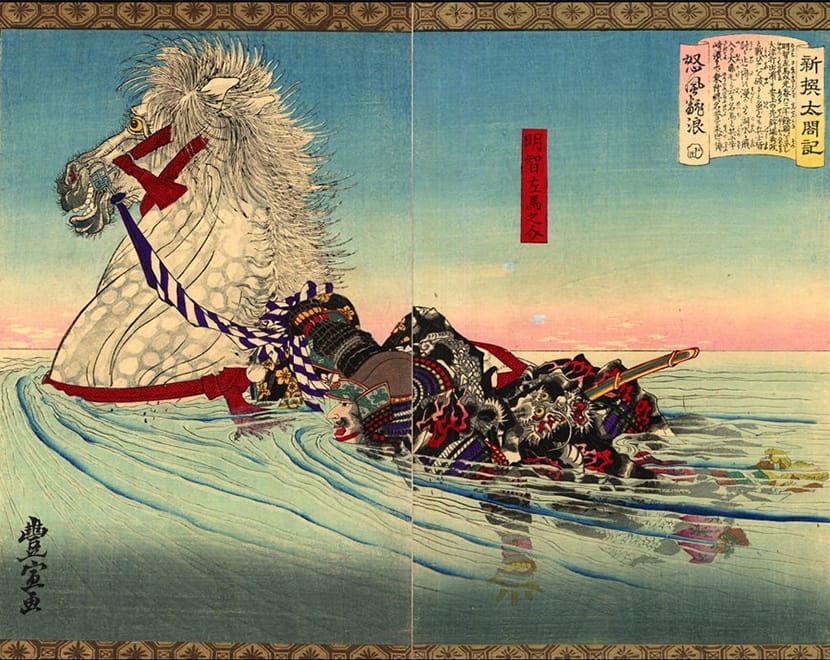
The following scene is also musically peculiar in its depiction of Mitsutoshi’s famous ride from a distant viewpoint, and resembles a camera shift from “zoom” to “wide angle” in the beautiful landscape of Lake Biwa with three different nagashi in very close succession, a span of only 20 lines (from 48 to 67). Normally, when three nagashi appear in a ballad, they tend to become structurally the arioso pillars of a whole some 120-line long piece: one figuring at the beginning, one in the middle and one at the end, being separated from each other by numerous lines of pure narrative.
The last of these three nagashi the text expresses Mitsutoshi’s reaching land and his recognition that the AKECHI clan is lost. He sadly caresses then the mane of his beloved horse. At this moment, one of the most touching interludes is performed: Gogō has a heart throbbing lament quality with an invocative repetition of high pitches. It is short, but wonderfully expresses Mitsutoshi’s tenderness and his sorrow.
A further highlight, seen after line 75, is the rarely performed interlude Kiku (chrysanthemum), which uses the highest possible pitch on the biwain the first section. That means the 5th string has on the 5th fret to be pressed down with extreme force by the left hand to produce the proper pitch. This may account for female players occasionally replacing this interlude with another one, which requires less physical strength.
